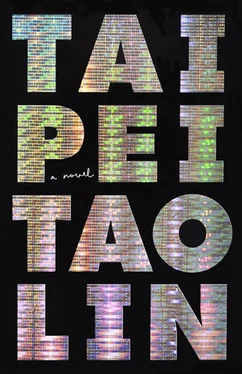“No, Beau,” said Erin.
“Nobo?” said Paul grinning.
“Beau. He said ‘mons pubis.’ Ew.”
“What does that mean?”
“It’s a part of the body,” said Erin with a worried expression.
“You guys are seeing. . you guys are together again?”
“No, we’re not,” said Erin shaking her head. “This is, like, unacceptable behavior.”
“You’re not together?”
“We were. . but then I broke up with him. . again.”
“Again? After we ate steak on your birthday?”
“Yeah,” said Erin.
“So. . you got back together after that?”
“Well, no, but. . he told me he was unemployed, and all this bad stuff was happening to him, and I felt bad.”
Paul made a quiet, ambiguous noise.
“We’ve, like, hung out,” said Erin.
“Oh,” said Paul, unsure if he was confused.
“But we’re not together,” said Erin quietly, then drank a shot of tequila and most of a Four Loko (for a video she’d told someone she would post on her Tumblr) and an hour later, Paul saw after being in the bathroom a few minutes, was asleep with her mouth slightly open and her MacBook open on her stomach. After untangling a cord, then moving the MacBook to the floor, Paul lay beside Erin and meekly pawed her forearm three times, then briefly held some of her fingers, which were surprisingly warm. He lay stomach-down with his arm on her arm, thinking that if she woke, while he was asleep, this contact could be viewed as accidental. Maybe she would roll toward him, resting her arm across his back — they’d both be stomach-down, as if skydiving — in an unconscious or dream-integrated manner she wouldn’t remember, in the morning, when they’d wake in a kind of embrace and begin kissing, neither knowing who initiated, therefore brought together naturally, like plants that join at their roots. After a few motionless minutes, unable to sleep in his increasingly tense position, he rolled over and gathered a blanket into a cushiony bunch, which he held like a stuffed animal of a brain, and slept facing a wall.
The next afternoon, at the University of Baltimore, in a lounge area, bright and warm from sunlight through glass panels, Paul and Erin sat on padded chairs and watched last night’s footage, which they felt was “unseemly” and decided not to edit into a video to put on YouTube. At a soup-and-sandwich restaurant, two blocks away, they discussed what movies they wanted to make—
Heroin,
in which they inject heroin in each other and “work on things” on their MacBooks, recording six perspectives: their faces, their MacBook screens, their positions in the lounge area (from cameras on tripods in the distance) in sunlight on separate padded seats.
Cocaine,
in which a third person records them going to nightclubs and bars on a Friday night in Manhattan without a plan except that they must snort cocaine every ten minutes and will carry knapsacks filled with energy drinks and fried chicken.
Or Something,
in which “or something” is said hundreds of times, in a montage, sometimes with context, to convey a range of meanings: a grinning Erin “luxuriating” in her lack of specificity, a zombie-like Paul “tired” of his commitment in specifying uncertainty, Erin saying “or something, or something,” earnestly to a Paul who has become “tolerant” to “or something.”
— then returned to the lounge area and worked on things separately, until night, when they began texting people and asking on Facebook if anyone within fifty miles wanted to sell them drugs. Someone would walk to Erin’s car to sell her cocaine and heroin, said Beau in a text, if she parked in a specific area of a shopping plaza.
“That’s like. . I don’t know,” said Paul quietly while trying to think about why Erin had texted Beau. Erin was quiet, then said she didn’t want to try that option, then they walked four blocks to her apartment, where they used Xanax and Hydrocodone before driving to an apartment where someone had LSD, which they used with a little cough syrup. They drove to a movie theater and watched Jackass 3D, then couldn’t find an open restaurant, so decided to drive to New York City. They arrived around 8:30 a.m., to an afternoon-like morning, not hungry or tired, due to Adderall.
They decided to film MDMA without a plan, except to use MDMA and go canoeing in Central Park. After showering in Paul’s apartment, then riding the L train to Union Square and using MDMA in Whole Foods, then getting off an uptown 6 train four stops early by accident, they decided to go to Times Square instead of Central Park. They rode the Ferris wheel inside Toys “R” Us, then discovered that on MDMA they could easily speak in an unspecific, aggregate parody of (1) the stereotypical “intellectual” (2) most people in movies (3) most people on TV with a focus on newscasters and National Geographic — style voice-overs. They termed this manner of speaking (almost the opposite, especially for Paul, of the quiet and literal and inflectionless voice they normally used to speak to each other) “the voice,” using it, in Barnes & Noble, with high levels of amusement and stimulation, to feign egregious ignorance, improvise seemingly expert commentary on specific objects, excessively employ academic terms and literary references.
That night, at Pure Food and Wine, an organic raw vegan restaurant near Union Square, seated outside the entrance in a kind of waiting area, they each ate a psilocybin chocolate with their salads. Their plan was to attend an Asian American Writers’ Workshop fund-raiser in an art gallery, after eating, to record part one of Mushrooms. Exiting the restaurant, a woman looked down at Erin’s MacBook with an affectedly bemused expression and asked with a French accent if it was recording.
“Yes,” said Erin smiling.
“You are recording yourself?”
“Yeah,” said Erin grinning.
“That is weird, no?” said the woman, and walked away.
“I feel like I hate everyone,” said Paul a few minutes later, walking toward the art gallery.
“Huh?” said Erin. If she didn’t hear something, Paul had noticed, she would sometimes appear confused in a frightened, child-like way, as if having assumed she’d been insulted.
“I feel like I hate everyone,” said Paul.
“Yeah,” said Erin, and smiled at him.
“Really?” said Paul, a little surprised.
“Yeah. Well, everyone on the street.”
“I feel like I can’t even look at anyone,” said Paul.
They were on their sides facing each other on Paul’s mattress, in his room, dark except for moonlight, around 3:30 a.m. After the fund-raiser, at which a saxophone player had ranted about identity politics until people, after maybe six minutes, actually began booing, they’d walked aimlessly into a gallery across the street, then had eaten dinner, four blocks from Paul’s apartment, at Mesa Coyoacán. Paul scooted toward Erin, and they hugged five to ten seconds and began kissing and removing their clothes. Erin’s eyes, whenever Paul looked, seemed to be tightly closed, which seemed like “not a good sign,” as he’d read on her blog — or somewhere — that she liked sex with “a lot of eye contact.” They were sweating, and their heads were on the opposite side of the mattress from before, when they finished, after around fifty minutes.
That night, in the library, Paul texted Erin, who’d left for Baltimore at 7:40 a.m. for a 12:30 p.m. public-speaking class, asking if she wanted to attend an event— Caked Up! — in two days in an art gallery, where cakes made by graphic designers, including Paul’s brother, would be served buffet style. Paul texted it might not be worth the drive, since they would be driving eight hours the day after to Ohio, where Calvin had organized a reading and they would be staying three nights. When Erin promptly responded yes and that it wouldn’t be inconvenient, because she liked driving, Paul was surprised how relieved he felt — how disappointed he would’ve been if she had declined — and realized, with excitement and a concurrent adjustment of his default mood to “eager and patient,” that he was (or that he now, after Erin’s response, viewed himself as being) in a stable situation of mutual, increasing attraction.
Читать дальше












